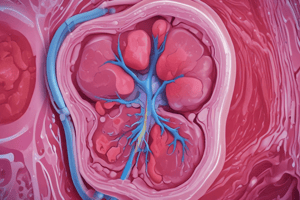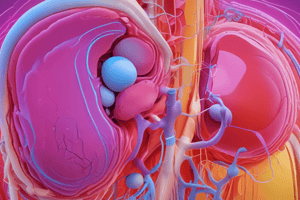Podcast
Questions and Answers
What is a common cause of hydronephrosis in adults?
What is a common cause of hydronephrosis in adults?
- Dehydration
- An enlarged prostate (correct)
- Liver disease
- Bladder infections
Which imaging test is typically used for diagnosing hydronephrosis?
Which imaging test is typically used for diagnosing hydronephrosis?
- MRI
- Echocardiogram
- Ultrasound (correct)
- X-ray
What is a symptom that is more common in infants with hydronephrosis than in adults?
What is a symptom that is more common in infants with hydronephrosis than in adults?
- Vomiting
- Painful urination
- Back pain
- Fever (correct)
How can untreated hydronephrosis affect the kidneys?
How can untreated hydronephrosis affect the kidneys?
What is the primary goal of treatment for hydronephrosis?
What is the primary goal of treatment for hydronephrosis?
Which of the following is a common cause of hydronephrosis in infants?
Which of the following is a common cause of hydronephrosis in infants?
What is the most common treatment for severe cases of hydronephrosis?
What is the most common treatment for severe cases of hydronephrosis?
Which of the following is a potential complication of untreated hydronephrosis?
Which of the following is a potential complication of untreated hydronephrosis?
What is the best way to prevent hydronephrosis?
What is the best way to prevent hydronephrosis?
What is the main cause of hydronephrosis?
What is the main cause of hydronephrosis?
How can hydronephrosis be diagnosed?
How can hydronephrosis be diagnosed?
Study Notes
Hydronephrosis: Causes, Symptoms, Diagnosis, and Treatment
Hydronephrosis is a condition in which one or both kidneys swell due to a blockage or obstruction in the urinary tract. The condition can lead to kidney damage if left untreated, but most cases resolve without causing permanent kidney damage. In this article, we will discuss the causes, symptoms, diagnosis, and treatment of hydronephrosis.
Causes
Hydronephrosis is typically caused by a blockage or obstruction in one of the parts of the urinary tract. In adults, common causes include kidney stones, an enlarged prostate, and conditions that affect the muscles near the urethra and bladder. In infants, hydronephrosis is often due to an obstruction that occurs during fetal development.
Symptoms
Symptoms of hydronephrosis depend on the cause and can range from mild to severe. Adults may experience sudden or intense pain in the back or side, vomiting, painful urination, and blood in the urine. Symptoms in infants are often less noticeable and may include multiple urinary tract infections, pain in the abdomen or side, blood in the urine, and fever.
Diagnosis
Hydronephrosis is typically diagnosed with imaging tests such as ultrasound, CT scan, or voiding cystourethrogram. In infants, hydronephrosis can be detected as early as the first trimester of pregnancy during an ultrasound.
Treatment
The goal of hydronephrosis treatment is to restore the flow of urine from the kidney and decrease the swelling and pressure. Treatment depends on the underlying cause. In mild cases, the condition may resolve on its own. For more severe cases, treatment may include surgery to remove the obstruction, nephrostomy tube placement to drain excess urine, or ureteral stent placement to hold the ureters open.
Complications
Untreated hydronephrosis can lead to kidney damage or failure. In severe cases, patients may require dialysis or a kidney transplant.
Prevention
Prevention of hydronephrosis depends on avoiding or promptly treating the underlying cause. Some factors that increase the risk of hydronephrosis include kidney stones, urinary tract infections, and a narrow urinary tract due to infection.
In conclusion, hydronephrosis is a common condition that can lead to kidney damage if left untreated. Early diagnosis and treatment are crucial for preventing complications and restoring urine flow from the kidney.
Studying That Suits You
Use AI to generate personalized quizzes and flashcards to suit your learning preferences.
Description
Test your knowledge about the causes, symptoms, diagnosis, and treatment of hydronephrosis, a condition where one or both kidneys swell due to a blockage in the urinary tract. Learn about the complications, prevention, and importance of early detection.




